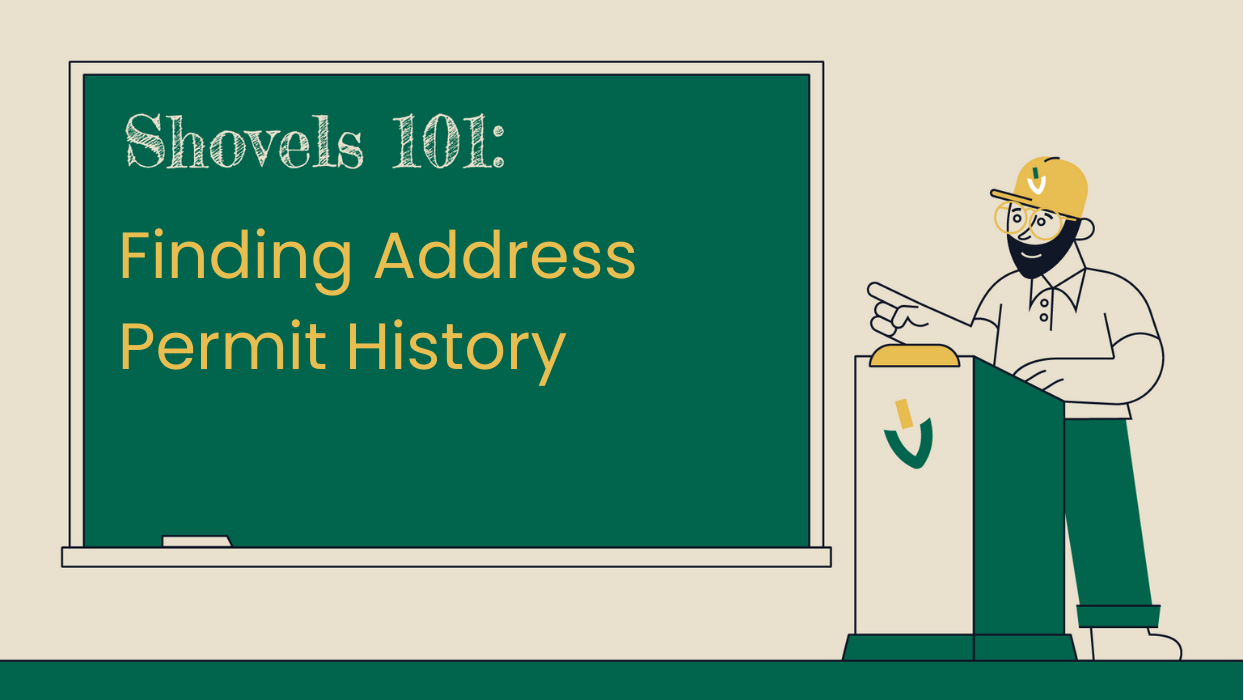Understanding a property’s permit history is critical to any project. Whether you’re researching a new property to acquire, or double-checking what previous owners have done to one you already own, it’s important info to have.
With the Shovels API in your toolbox, finding permits specific to a given address is a breeze.
Authentication and Setup
If you don’t already have a Shovels Web App account (welcome!), then head over and setup a Free Trial. Go to the Settings page to get your API Key, read over our API Docs, and open your preferred terminal, shell, or editor.
For a more in-depth introduction to using our API, please check out our blog post guide on How to use the Shovels API.
This guide will assume a basic familiarity with cURL, JSON parsing, and our API schema. Example query snippets will use cURL, but our API docs have examples in a variety of other languages too.
Using the Shovels API
To set the scene, imagine that you’re a prospective buyer wanting to do your due diligence on an intriguing property. The building was constructed in the last 15 years, and it’s important to you that the previous owners have kept everything above board with the required permits and inspections handled.
With the Shovels API, you can get from address to detailed permit history based on the jurisdiction’s own books with three API calls.
Step 1: Finding the Address
Using the GET Search Addresses endpoint, search for the address to confirm that there are any permits on record (our system goes back ~20 years).
A sample query, for a “123 Main St”, should look something like this:
curl -i -X GET 'https://api.shovels.ai/v1/addresses/search?q=123%20MAIN%ST'
-H 'X-API-Key: YOUR_API_KEY_HERE'
Important: Remember to use
%20to denote any spaces in the address string, and that the correct endpoint here is /addresses/, NOT ~~/address/~~.
Assuming your other syntax and API key is input correctly, this request should return the following:
[
{
"street_no":"123",
"street":"MAIN ST",
"city":"ST. FRANCISVILLE",
"zip_code":"12345",
"zip_code_ext":null,
"state":"LA"
},
{
"street_no":"123",
"street":"SO MAIN ST",
"city":"ST. ALBANS",
"zip_code":null,
"zip_code_ext":null,
"state":"VT"
},
{
"street_no":"123",
"street":"MAIN ST",
"city":"NACOGDOCHES",
"zip_code":"75961",
"zip_code_ext":null,
"state":"TX"
},
{
"street_no":"123",
"street":"MAIN ST",
"city":"AGAWAM",
"zip_code":"01001",
"zip_code_ext":null,
"state":"MA"
},
{
"street_no":"123",
"street":"MAIN ST",
"city":"HOPKINTON",
"zip_code":"02804",
"zip_code_ext":null,
"state":"RI"
}
]
The returned list of addresses is ordered by relevance and formatted according to USPS standard. In this case, of all the matching addresses in the US, five of them have relevant permit histories.
Pick which address you want to dig deeper into, and proceed to step 2.
Note: Permit availability rates can vary drastically for a number of reasons (offline or infrequently uploaded records, isn’t yet in our jurisdiction Coverage Map, or many others). If your desired address isn’t included, then please reach out to us at support@shovels.ai and we’ll take a look.
Step 2: Retrieve Permits for the Address
Using the data returned in Step 1, we will now retrieve the exact permits themselves for the desired address.
Using the GET Permits by Address endpoint, enter the relevant address data to the next query. The list of required parameters are noted in the schema on the API doc linked just above.
Again, a sample query, for “123 Main St, Agawam, MA 01001”, would look something like this:
curl -i -X GET 'https://api.shovels.ai/v1/permits/address?street_no=123&street=MAIN%20ST&state=MA&city=AGAWAM&zip_code=01001'
-H 'X-API-Key: YOUR_API_KEY_HERE'
Important: The multiple parameters required for this endpoint are noted with the AND
&operator.
This second request should return the following:
{
"items":
[
"5c4015a630e941b6",
"0eb49a17aa7e8791",
"77d2073b694190dd",
"cd66d9dda0662b59",
"5575716497ab9bd6"
],
"page":1,
"size":5,
"next_page":null
}
which shows that there are 5 permits on record for this address. These Permit IDs are unique to the Shovels platform, but can be used to retrieve the detailed permit details.
To do so, proceed to Step 3.
Step 3: Return Detailed Permit History
Using the GET Permits by ID endpoint, you can search for a single (or string array) of permit IDs.
In this sample, to request the first permit payload would look something like this:
curl -i -X GET 'https://api.shovels.ai/v1/permits?id=5c4015a630e941b6'
-H 'X-API-Key: YOUR_API_KEY_HERE'
Important: Searching for multiple permits at once requires a string array, which is denoted in the cURL request by the
&id=stringclause for each additional permit ID.
The third request for the single permit should return the following:
[
{"id":"5c4015a630e941b6",
"description":"Replace existing 12' x 14' deck with a 20' x 20' deck (estimated cost $8,000), zone res a2, receipt No.58233",
"number":"17961",
"jurisdiction":"Agawam Town",
"job_value":null,
"type":"Building",
"subtype":"Building permit - new",
"fees":null,
"status":"active",
"file_date":"2014-04-14",
"issue_date":null,
"final_date":null,
"construction_duration":null,
"approval_duration":null,
"inspections_pass_rate":null,
"contractor_id":null,
"address":
{
"street_no":"123",
"street":"MAIN ST",
"city":"AGAWAM",
"zip_code":"01001",
"zip_code_ext":null,
"state":"MA",
"latlng":[42.087486267089844,-72.6227035522461]
},
"tags":
["accessory_structure","residential"]
}
]
And there you have it! This information can be exported for whatever outside needs you have, and this process can be easily repeated for any addresses and permits needed.
The same information is searchable via our Web App at https://app.shovels.ai/.
For enterprise-level usage, get our full dataset with deeper insights, dashboards, and flat files. However you need to retrieve this data, we’ll make it happen.
Troubleshooting Tips
- A full list of our error codes are described in our API docs here. Most errors are 404s, which frequently mean either the address is input incorrectly, or there isn’t a permit record on file to match the search terms.
- If you are able to find the correct address in our Web App, then double check the syntax of the request.
- If you run into any other questions, please email us at support@shovels.ai and we’ll help you!
Conclusion
We hope this guide is helpful (and we’ve got more on the way). Our API is meant to be intuitive and easy to use, so we definitely want to know any and all hiccups you encounter. If there’s an endpoint that we don’t support yet, or any other feedback for our platform, we’d love to hear it.
We’re building out Shovels API v2 right now, and your requests might make the next release.
Happy Building!


